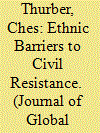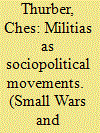| Srl | Item |
| 1 |
ID:
160474


|
|
|
|
|
| Summary/Abstract |
While ethnic cleavages have featured prominently in our understanding of civil wars, attention to ethnic and social structures has been surprisingly absent from the recent wave of research on civil resistance. Yet these structures likely have an important impact on when and where we see nonviolent campaigns occur. This article argues that the strategic logic of civil resistance presents high barriers to entry for politically excluded ethnic minorities. Constraints on these groups’ ability to activate mechanisms central to an exclusively nonviolent strategy either prevent them from getting a civil resistance campaign off the ground or deter them from ever attempting to do so. Using original data on the ethnic composition of nonviolent and violent campaigns, I show that nonviolent campaigns are less likely than violent ones to include participants from politically disadvantaged ethnic groups and also less likely to feature ethnic political claims. Furthermore, I find that political exclusion and small group size reduce the likelihood that members of an ethnic group will initiate a campaign of civil resistance.
|
|
|
|
|
|
|
|
|
|
|
|
|
|
|
|
| 2 |
ID:
134169


|
|
|
|
|
| Publication |
2014.
|
| Summary/Abstract |
The Shia militia has emerged as one of the most powerful and important actors in the Middle East security environment. Despite this trend, they remain poorly understood by scholars and policymakers alike. This article seeks to expand our understanding of the militia as a type of non-state armed group through an examination of Shia militia movements in Iraq between 2003 and 2009. More than simply warlords, paramilitaries, or foreign proxies, Shia militias in Iraq enjoyed substantial popular legitimacy, pursued a broad social and political agenda, and participated actively in the formal institutions of the state. Understanding the triangular relationship between the militia, the state, and the population is essential in explaining the rise and fall of the Shia militias during the US occupation as well as in developing strategies to deal with their most recent resurgence
|
|
|
|
|
|
|
|
|
|
|
|
|
|
|
|
| 3 |
ID:
170018


|
|
|
|
|
| Summary/Abstract |
This article examines the impact of social ties on a challenger's ability to initiate a civil resistance campaign. Recent waves of nonviolent uprisings, from the color revolutions of Eastern Europe to the Arab Spring, have sparked renewed scholarly interest in civil resistance as a strategy in conflict. However, most research has focused on the effectiveness and outcomes of civil resistance, with less attention paid to when, why, and how challengers to regime power come to embrace a strategy of nonviolent action in the first place. Drawing upon a longitudinal analysis of challenger organizations and coalitions in Nepal, this article illustrates how social ties inform challengers’ assessments of the viability of civil resistance and consequently shape their strategic behavior. The findings complicate state-centric approaches to contentious politics by showing how diverse actors within the same state face different sets of political opportunities and constraints. They also highlight the indeterminate effects of ideology, as variation in challengers’ social ties drive Gandhians to take up arms and Maoists to lay them down.
|
|
|
|
|
|
|
|
|
|
|
|
|
|
|
|